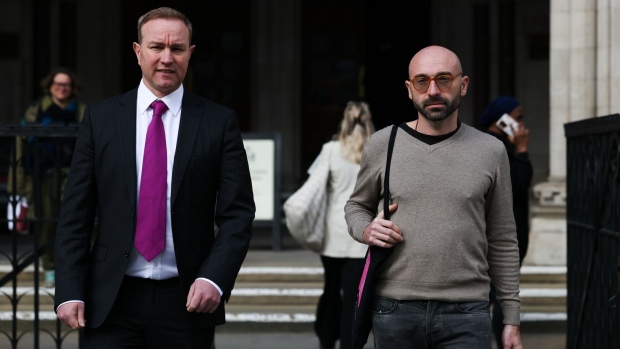Mar 27, 2024
Ex-UBS Trader Tom Hayes Loses UK Appeal Over Libor Crimes
, Bloomberg News

(Bloomberg) -- Tom Hayes, the former star trader who became the face of the Libor scandal, lost an appeal to overturn his near decade-old criminal conviction, drastically narrowing any route to exoneration in English courts.
The Court of Appeal said Wednesday the ex-UBS Group AG and Citigroup Inc. trader’s conviction over interest rate-rigging should stand as there was clear evidence that he deliberately manipulated the London interbank offered rate. Ex-Barclays Plc trader Carlo Palombo also lost his appeal.
Prosecutors alleged at separate trials that both men, along with a select group of bankers, manipulated key interest rate benchmarks used to value more than $350 trillion of loans and securities. Hayes was ultimately sentenced to 11-years in prison in 2015, while Palombo was sentenced to four in 2019.
Ever since he was released from prison in 2021 after serving half his jail sentence, Hayes has worked tirelessly to try and prove his innocence. Lawyers for the two men said they would attempt to take their appeals to the UK Supreme Court, although it has no obligation to accept them.
Read More: The Tom Hayes Libor Appeal Was a Decade in the Making: Timeline
The result will come as a major relief to the Serious Fraud Office that has suffered a series of setbacks and embarrassments in recent years.
“The Court of Appeal’s judgment is clear that these convictions for fraud are still as relevant today as ten years ago,” the SFO said following the ruling. “No one is above the law and the court has recognized that these convictions stand firm.”
Hayes and Palombo were given the chance to appeal their convictions after the Criminal Cases Review Commission, the body that investigates potential miscarriages of justice, found they had a reasonable prospect of success. Hayes’ previous appeal in 2015 saw his sentence cut from 14 years but the criminal conviction remained.
The CCRC based its findings on a US court decision that overturned the convictions of two Deutsche Bank AG traders over interest rate fixing. That court ruled that the conduct, setting the rates to benefit the banks commercially, was not against the rules and couldn’t be seen as being fraudulent.
The US ruling “did not therefore cast doubt on the correctness of the previous decisions of this court as a matter of English law,” the judges said in a summary of the decision.
Standing outside the Royal Courts of Justice, Hayes spoke to reporters after the verdict. Should the top court not take his appeal he indicated that he would head for the European Court of Human Rights.
“The UK remains an international outlier in relation to the definition and operation of Libor,” he said. “The question is for international financial markets, can we allow such a discrepancy to continue?”
At his trial in 2015 prosecutors said that Hayes was the “ringmaster” of a global network of 25 traders and brokers from at least 10 firms who tried to manipulate Libor on an industrial scale to maximize profit. By 2017, a dozen banks had paid penalties approaching $10 billion for rigging the benchmarks. However, criminal prosecutions outside of the UK rarely materialized and those that did in the US were ultimately overturned.
At the first trial of Palombo, where jurors failed to reach a verdict, he cast himself as a junior trader doing what he was told. Earning £400,000-a-year he said that his job amounted to that of a tea boy or someone who works at McDonalds compared to senior traders. He was convicted after a second trial.
Prosecutors said traders like Hayes were driven by greed and blind ambition. Key to the case against Hayes were hours of interviews with the UK’s Serious Fraud Office in 2013, during which he detailed his methods and named alleged co-conspirators. After initially cooperating with the SFO, Hayes pleaded not guilty and went to trial.
The judges said there was “indisputable documentary evidence showing that what Mr. Hayes was seeking to do, to move the Libor rate, was accompanied by attempts to maintain secrecy, as well as his frank admissions of dishonesty in the scoping interviews.”
(Updates throughout)
©2024 Bloomberg L.P.






